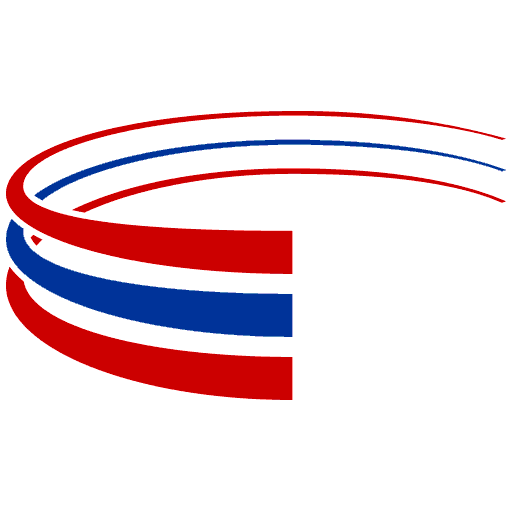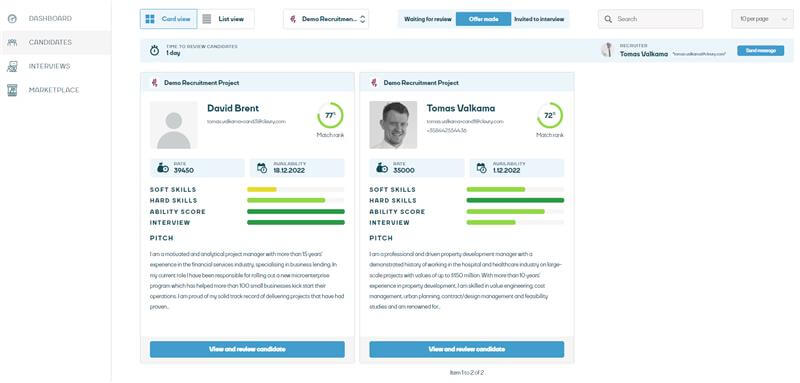Recruitment process
Clevry’s data-driven recruitment process helps identify the right talent, predict job performance, and reduce mis-hires.
We offer a comprehensive and tailored recruitment process to meet each client’s needs. With decades of experience in the recruitment industry and the use of the best scientific methods, we ensure that we find the right talents efficiently and with high quality, whether it’s for a single role or a broader recruitment need. Our scientific research shows which factors predict job success and which competencies are relevant for success in various job roles.
Recruitment with a difference
Clevry's talent assessment tools are used in every recruitment process to measure candidates' soft skills and development potential.
Hard skills provide the basic requirements for a job, but soft skills determine true success. Role-specific profiles are created based on Clevry’s scientific research and role mapping. By measuring soft skills, motivation factors, and cultural fit that have been proven to correlate with success in a given role, we always ensure the best match between employer and candidate. Our recruitment process is the same whether it is direct recruitment or staffing. You decide whether to hire the talent directly into your company or utilize the staffing model.


Clevry's Data-Driven Recruitment Process Step-by-Step
1. Profile definition and opening the search
The first step in the recruitment process is defining the profile with the client. We conduct an in-depth needs analysis, where we thoroughly explore the role’s requirements and the company’s needs and determine the necessary soft and hard skills depending on the role, such as:
- Soft skills: Communication skills, leadership skills, teamwork skills, and problem-solving skills
- Hard skills: Technical expertise like programming languages, certifications, language skills, or proficiency in specific software
During the profile definition, we set clear goals and metrics to guide the recruitment process and ensure that the chosen candidate meets the client’s expectations. Once the profile is clear, we publish the job advertisement across various channels. At the same time, our Talent Sourcing team begins a proactive search for candidates from targeted networks and contacts. This process ensures that we also reach passive candidates who may not actively be looking for a job but could be ideal for your role.
2. Psychometric tests and pre-screening of candidates
After a candidate has submitted the required information and applied, they are directed to complete psychometric tests on Clevry’s assessment platform, improving the recruitment process’s quality and objectivity. Our validated tests draw on decades of experience in organizational psychology and test development. Each candidate completes a role-specific personality assessment and a cognitive ability test. Ability tests are always tailored to the role; for instance, numerical reasoning tests are used for finance roles, while logical reasoning tests are used for engineering positions. Based on the applications, CVs, and assessment results, we conduct a brief phone interview with the most potential candidates and put the best ones through to an interview with the recruiter.
3. Structured interview
Our recruiters interview the top candidates using Clevry’s interview report based on assessment results. The personality assessment results help reflect the candidate’s strengths and weaknesses in relation to the role’s requirements and identify any potential concerns. A structured interview combined with psychometric tests significantly increases the likelihood of a successful hire
4. Candidate presentations and client interviews
After the recruiter interview, we present the top candidates to the client through our unique client portal. Typically, we present 1-3 candidates for each open position. Once the client has met the most promising candidates, they make the final hiring decision. Our recruiters are available to assist in the decision-making process if needed. We always provide the client with a customer status report, which transparently details the different stages of the recruitment process and the activities carried out.
5. Performance monitoring and feedback
We actively seek feedback and monitor the progress of the collaboration to ensure that the new employee gets off to a good start in their role. Our service always includes an onboarding report for the client, offering valuable tips on leading and engaging the new team member. If a staffing consultant decides to resign or fails to perform as expected, we immediately start a new search at no extra charge.
6. Staffing - Consultant Care
Clevry acts as the employer in staffing service and takes responsibility for all employer obligations. Our Consultant Care team acts as a link between the employee and the client company, supporting the employee in all matters related to the employment relationship. We aim to have motivated and productive staffing consultants who are happy in their roles.

Recruitment process
Your own recruitment portal
Forget about back-and-forth emailing. As our client, you have access to your own recruitment portal. Our unique candidate presentation provides a clear and visual view of the candidate’s suitability for the role.
Communicate with the recruiter, compare candidates, and schedule interviews with the top candidates easily, all in one place.
Psychometric tests as part of the recruitment process
Clevry combines solid recruitment expertise with top-notch science. For over 30 years, our experienced organizational psychologists and software developers have combined science and technology to develop a wide range of assessment tools supported by a market-leading technology environment. Our assessments are based on scientific research into how personality, cognitive abilities, and competencies affect an individual’s job performance and correlate with success.
Psychometric tests, such as personality assessments and cognitive ability tests, are naturally a part of every recruitment process. These tests help identify the most suitable candidates, increase recruitment objectivity, and minimize the risk of costly mis-hire.
Recruitment process - FAQ
Employers – Frequently asked questions about the recruitment process
The recruitment process is a step-by-step procedure through which a company or organization selects and hires a suitable person for an open job position.
The recruitment process varies depending on the organisation and job role, but it typically includes the following stages:
- Defining the need: The organisation identifies the need for a new employee and defines the required skills and experience.
- Creating the job advertisement: The organisation drafts a job ad outlining the job description, requirements, and benefits.
- Receiving applications: After the job ad is published, applicants send in their applications, usually including a CV and a cover letter.
- Candidate screening: Applications are reviewed, and the best candidates are selected based on specific criteria.
- Interviews: After screening, selected candidates are invited for interviews, which can be a single or multi-stage process and may include group interviews or practical tasks.
- Tests and assessments: Candidates may undergo tests or assessments in some recruitment processes. Clevry uses psychometric tests early in every recruitment process to ensure candidate quality.
The duration of the recruitment process can vary depending on many factors, such as the company’s size, the nature of the open position, and the number of people involved in decision-making. Clevry presents assessed and suitable candidates to clients on average within seven days. The total recruitment process duration depends on the factors mentioned and the client’s schedule, typically around 2-4 weeks
Our recruitment process consists of the following stages: profile definition with the client, opening the search and contacting passive candidates, pre-screening and phone interviews, psychometric tests and structured interviews, and finally, presenting the best candidates and client interviews
Candidates invited for interviews are selected based on their skills, experience, and the competencies highlighted in their applications that match the requirements of the open role. During the application stage, we use the best scientific methods to assess candidates and identify the most suitable ones to move forward.
We handle all personal data by data protection legislation. We store application information securely and use it only for recruitment purposes.
Candidates – Frequently asked questions about the recruitment process
We keep all applicants updated on the progress of the process via email, phone, or text message. We aim to keep candidates informed and understand that all information is important to them. We provide updates even when there is no advancement on the client side or the process is delayed.
Familiarise yourself with the company and the role you’re applying for. Read the job advertisement carefully to understand the job requirements and expectations thoroughly. Dress appropriately for the occasion and consider questions you’d like to ask the employer.
We will provide you with all the necessary information and instructions in advance. Prepare by being well-rested and calm to perform at your best—and remember to be yourself!
All candidates complete Clevry’s work personality assessment as part of the recruitment process and receive a feedback report on their results to support their career choices and personal development. We also explain to the candidate which specific factors the client company emphasized for the role.
If you want to change your application, please get in touch with our recruitment team as soon as possible. We can update your details if the recruitment process has not yet advanced to the interview stage.
Tailor your application to the job’s requirements, highlighting your skills and explaining why you would be the best candidate for the position. Always customize your application for each job you apply for. Prepare for the interview by thoroughly researching the company and the role.

